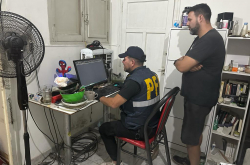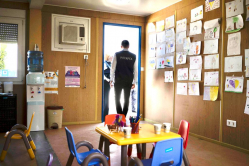The best way to protect your children is to develop an open and honest dialogue concerning the use of social media, apps, games and the Internet.
Start encouraging safe habits and raising awareness about cyber dangers as soon as possible, ideally as soon as they start going online. There is ‘good’ and ‘bad’ content out there: talk about the difference between the two.
While up-to-date filtering and reporting tools can be helpful (and reassuring for parents), they do not solve all online problems. Children and teenagers should feel like they can come to you if they feel threatened or uncomfortable.
If they do approach you with a problem, tell them they have done the right thing and seek support from national authorities, educators or specialist groups.
Reduce your children’s exposure
We encourage parents to avoid overexposing their children online. Although you may think that sex offenders only collect and trade explicit images, police often find photos of children in everyday situations such as at the beach or in the bath.
Tips for children and teenagers
Read this advice if you use any device connected to the Internet such as phones, tablets, computers, televisions and intelligent home assistants. Protect yourself!
Privacy
- Stay in control of your devices, information and passwords.
- Check your privacy settings regularly to ensure they remain high.
- Don’t share your full name, date of birth, phone number, address or school.
Online friends
- The virtual world can be very different from the real world. Is your online friend who you think they are?
- Never arrange to meet a ‘virtual’ friend in real life without discussing it with an adult first. If you do agree to meet an ‘online’ friend ‘offline’, take safety precautions, whatever your age. Let people know where you’re going or take someone with you.
Think before you share
- Think twice about the messages and images you share, even with friends. If you’re afraid someone might read it or see it, then don’t post it.
- Trust your instinct. If you’re not comfortable with an online interaction, don’t reply.
- You can never fully erase what you’ve shared online. Once it’s posted, you lose control of it.
Report it
- Take screen shots to record any content that makes you uneasy, and show it to someone you trust.
- Mistakes happen. If you’ve done or shared something you regret, don’t let embarrassment stop you from reporting a threatening or dangerous situation.
In some cases, online predators count on the shame felt by victims to ask for more explicit photographs or videos, or personal information. If you are the target of blackmail or threats, cease all contact with the individual(s) and speak to someone you trust.
If you come across any content you don’t feel comfortable with, you can report it – either online at www.inhope.org or to your national police authorities.








